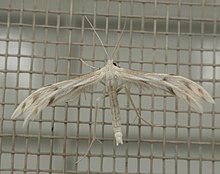Wheeleria spilodactylus, the horehound plume moth, is a moth of the family Pterophoridae, first described by John Curtis in 1827. It is found in South-Western and Central Europe and the Mediterranean, Asia Minor and North Africa. It has been introduced to Australia as a biocontrol agent for white horehound (Marrubium vulgare).[1]
| Wheeleria spilodactylus | |
|---|---|

| |
| Scientific classification | |
| Domain: | Eukaryota |
| Kingdom: | Animalia |
| Phylum: | Arthropoda |
| Class: | Insecta |
| Order: | Lepidoptera |
| Family: | Pterophoridae |
| Genus: | Wheeleria |
| Species: | W. spilodactylus
|
| Binomial name | |
| Wheeleria spilodactylus Curtis, 1827
| |
| Synonyms | |
| |


The wingspan is 20–25 millimetres (0.79–0.98 in). Adults are on wing from July to September depending on the location.[2]
The difficult to see larvae feed on black horehound (Ballota nigra) and white horehound.
References
edit- ^ "The release and establishment of two biological control agents of horehound (Marrubium vulgare L.) in south-eastern Australia". Weed information. Retrieved 2 August 2020.
- ^ Kimber, Ian. "Wheeleria spilodactylus (Curtis, 1827)". UKmoths. Retrieved 2 August 2020.
External links
edit- Species info Archived 2009-09-24 at the Wayback Machine